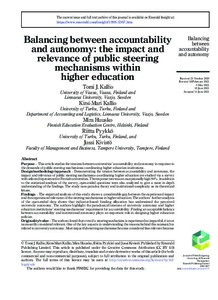Balancing between accountability and autonomy: the impact and relevance of public steering mechanisms within higher education
Kallio Tomi J.; Kallio Kirsi-Mari; Huusko Mira; Pyykkö Riitta; Kivistö Jussi
https://urn.fi/URN:NBN:fi-fe2021093048169
Tiivistelmä
Purpose
This article studies the tensions between universities' accountability and autonomy in response to the demands of public steering mechanisms coordinating higher education institutions.
Design/methodology/approach
Demonstrating the tension between accountability and autonomy, the impact and relevance of public steering mechanisms coordinating higher education are studied via a survey with selected representative Finnish universities. The response rate was an exceptionally high 94%. In addition to the statistical analysis of the survey, open-ended questions were also analyzed to give a more in-depth understanding of the findings. The study uses paradox theory and institutional complexity as its theoretical lenses.
Findings
The empirical analysis of this study shows a considerable gap between the experienced impact and the experienced relevance of the steering mechanisms in higher education. The authors’ further analysis of the open-ended data shows that indicator-based funding allocation has undermined the perceived university autonomy. The authors highlight the paradoxical tensions of university autonomy and higher education institutions' steering mechanisms' requirement for accountability. Finding an acceptable balance between accountability and institutional autonomy plays an important role in designing higher education policies.
Originality/value
The authors found that even if a steering mechanism is experienced as impactful, it is not necessarily considered relevant. One of the key aspects in understanding the reasons behind this mismatch is related to university autonomy. Most impactful steering mechanisms become considered less relevant because they also endanger institutional autonomy. In this sense, it could be expected that steering mechanisms should better balance accountability and autonomy.
Details
Journal of Public Budgeting, Accounting & Financial Management,
Type: Research Article
DOI: https://doi.org/10.1108/JPBAFM-10-2020-0177
ISSN: 1096-3367
Keywords
Kokoelmat
- Rinnakkaistallenteet [29337]
